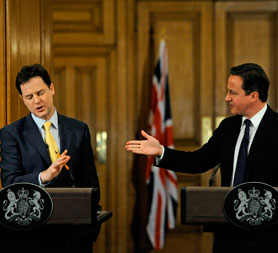Cameron and Clegg clash over AV voting system
David Cameron and Nick Clegg go head-to-head in outlining their opposing views on electoral reform, with the Prime Minister warning that the AV system will lead to regular hung parliaments.

David Cameron and Nick Clegg decided to make their first high-profile speeches of the electoral reform campaign on the same day – with the Deputy Prime Minister comparing the need for a change in the voting system with the emancipation of women.
The Prime Minister said that a Yes vote in May’s referendum on the Alternative Vote (AV) system would be “a massive backward step for accountability and trust in our politics”.
A hung parliament could bring parties together in the national interest – as has happened last May when the Coalition was formed – he said. But AV would result in more indecisive general election results.
“When there are more hung parliaments there will be more haggling and horse-trading between politicians – both before and after elections,” he added.
If the last election was under AV, there would be the chance – right now – that Gordon Brown would still be Prime Minister. David Cameron
“And there could well be an occasion where we have a genuine second-choice government. If the last election was under AV, there would be the chance – right now – that Gordon Brown would still be Prime Minister.”
Mr Cameron made clear that, while he intends to campaign vigorously against his Liberal Democrat deputy, the difference between them would not be a “coalition-breaker”.
In a speech in Leeds, Deputy Prime Minister Nick Clegg set out the case for adopting AV, insisting first-past-the-post was “out of date” and responsible for turning many voters off politics.
He said it encouraged MPs to be lazy as it allowed them to ignore large sections of the population and focus only on their core supporters.
The commitment to holding a referendum on AV – despite Conservative opposition to electoral reform – was a key concession for the Lib Dems in last May’s coalition negotiations.
Mr Clegg said: “It is no secret that the Prime Minister and I come at this from different directions. What we do agree on is that the people know best. We both want as many people as possible to get involved and make their feelings known at the ballot box.
“And what we are clear about is that this referendum is not about the Coalition Government. Whatever the result we will continue to work together in the national interest.”
“Whatever the result we will continue to work together in the national interest.” Nick Clegg
In 1951, the Conservatives and Labour had won 97 per cent of the vote, whereas in 2010, “they couldn’t muster two thirds”.
Mr Clegg said AV would give voters more power over politicians and reduce the number of safe seats in which MPs have a constituency for life.
Last year, “more than two-thirds of MPs were elected with fewer than half the voters in their constituencies choosing them”. That meant most people were represented by by an MP they had not chosen.
“It means millions of votes make no difference whatsoever. It means millions of voices going unheard. It makes it easy for MPs to get complacent and lazy. First-past-the-post is not working and it’s time to get rid of it. The beauty of the alternative vote is that it is evolution not revolution. It’s a small change which will make a big difference.”
How AV works
Under AV, votes are cast in order of preference and redistributed until one candidate has at least 50 per cent support.
Legislation for the referendum received Royal Assent only on Wednesday night after a torrid passage through the Commons and Lords.
Ministers needed to get the Bill through Parliament before Peers began their February half-term recess yesterday so it could be held on the same day as local and devolved elections on 5 May.
In a sign of how important the legislation was, Mr Clegg called off an official visit to South America this week to help secure the Bill’s passage.
So who's right? Cameron or Clegg? Read FactCheck: For and against AV